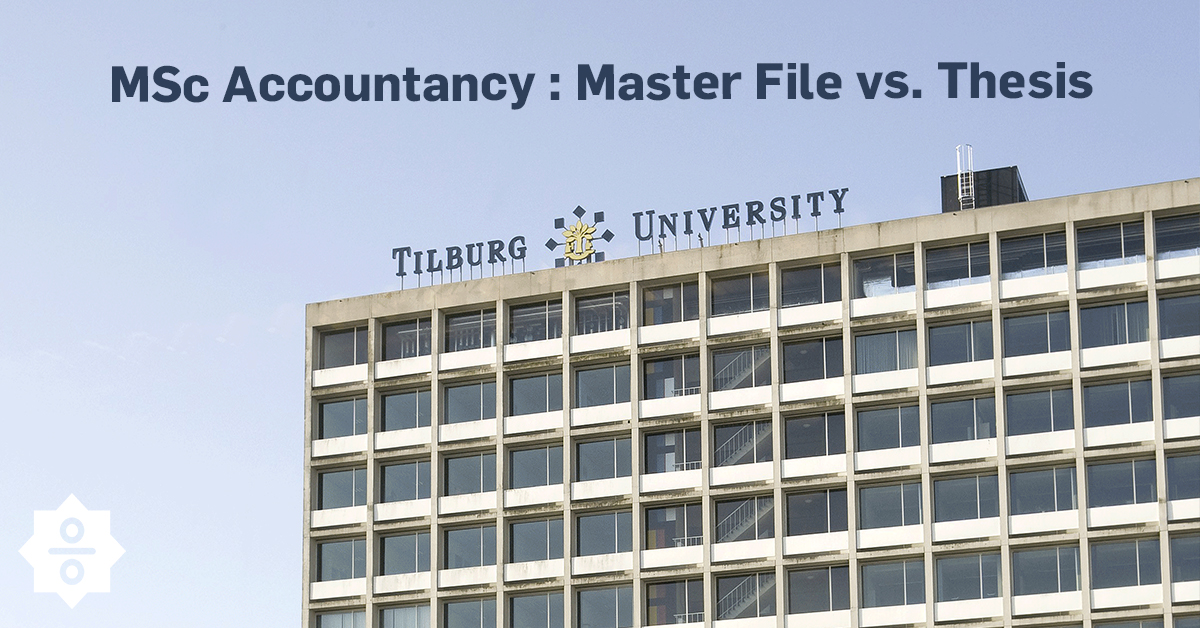For the Dutch version, click here
Over the years there have been many debates about whether a thesis at the end of a graduate’s education actually helps him/her in becoming a better employee in practice. Many have argued that a thesis can improve the skill set of the student and enhance his/her capabilities, while others have argued that it adds no extra value to what they will eventually end up doing. This has been the case in the accounting sector. Tilburg University has responded to this by taking a different path than other universities when it comes to writing a thesis. They have looked to improve the link between students and their future job. This has led the MSc Accountancy at Tilburg University to introduce the MSc File Accountancy, better known as the Master File, to replace the thesis of the graduate accounting students since the academic year of 2019-2020.
Master File
You might ask yourself, what is the Master File; and what makes it so special? The Master File is a more practice-oriented thesis but with a clear academic basis, and consists of three parts, namely a Business Application, a Replication Study and a Research Note. The Business Application focuses on a real-life problem experienced by a selected company. This company is then given advice through the use of published academic research of which the findings are applied to your individual case. Hence, this covers more of the ‘literature research’ that you would have ought to do in a ‘regular’ accountancy thesis.
In the Replication Study students have to select an already published research paper which they will have to replicate with a well-motivated variation in the context and/or time of the study. This part of the Master File is meant to cover and train your data analytics skills which are tested in the latter part of a regular thesis.
The Research Note, the third report, approximates a traditional thesis as most of us know. However, it has a shorter length than the traditional thesis as it is meant to be briefer. The goal of the Research Note is for the student to come up with a creative idea for a new research and to develop a plan on how this would be executed. Hence, the entire research should not be conducted, but the plan should be substantiated with literature research and the student should assess the appropriate data analytics that ought to be used.
These three components form together the Master File. The first two components each weigh 25% of the final grade and the third component weighs 50% of the final grade. Furthermore, it is important to mention that each component links to a different field within accounting. For example, you can conduct your Business Application in the setting of Management Accounting; your Replication Study in the setting of Financial Accounting; and your Research Note in the setting of Auditing.
Main Differences
Nevertheless, after conducting all three components, it is hard to try to find a clear difference between a regular thesis and the Master File. The main differences lie in the context that it is given in and in the skills that they focus on. The Business Application brings you in direct contact with the practical world as students will have to solve a real-life problem solely based on academic literature. This makes it clear that the Business Application pushes students to get in direct contact with the practical world, which is not the case for the regular thesis. The Replication Study focuses more on the replication of a study as to where a regular accountancy thesis would at least need an add-on and a clear contribution to the academic field and/or the practical field. As for the Research Note, since you are not conducting an entire thesis, with that meaning that the execution of empirical tests are limited, (though they must be planned out), the main difference lies in the execution of the project.
Pros and Cons
After having interviewed several students¹ that have completed the new Master File and other students that have completed the ‘old thesis’, they have named several pros and cons to the new Master File towards the ‘old’ thesis.
One pro that has often been accredited by the interviewees was the set-up of the Master File. Most students can agree that conducting the Business Application and the Replication Study before the Research Note has helped them a lot. The reason for this is because they were able to apply the skills that they have learned in the first two components of the Master File on to the third component. Next, students were keen to mention that they appreciated the more practice-oriented setting that the Master File has brought.
“Furthermore, almost every student interviewed also mentioned that a big pro was having to learn three different accounting subjects against just one.”
Furthermore, almost every student interviewed also mentioned that a big pro was having to learn three different accounting subjects against just one. This contributes to a broader knowledge within the field of Accountancy and has also contributed to increasing their expertise in all three areas as opposed to just one. Also, one student conducting the ‘old thesis’ mentioned that she was particularly jealous of the students following the new Master File. “The skills that they have gained while conducting the Replication Study was much more profound than mine. I felt like they really had less obstacles when conducting the Research Note compared to me when I was conducting my ‘old’ thesis”. Lastly, some students really liked the idea of spreading the workload over the entire year.
However, this also contributes to a con of the Master File since not all students really appreciated this. “Having your workload spread-out throughout the entire year may have its benefits, but it can sometimes get really busy when you have to follow your regular courses next to it.” Moreover, students have mentioned that they would have appreciated more guidance during their second assignment, which was the Replication Study. More specifically, they wanted more knowledge on how to replicate the data analytics of previous studies because most of them have not had a class of econometrics or advanced statistics in their bachelor years or pre-masters. “The absence of taking econometrical classes and/or advanced statistics in your bachelor years really shows when you try to challenge yourself during the Replication Study for a good grade”. Finally, starting the MSc Accountancy during the second semester (starting in February) meant that you immediately had to start with the Research Note instead of the Business Application. “This had taken away the benefit from conducting the Business Application and the Replication Study before your Research Note and can be perceived as more challenging for incoming students”, said one of the students who had conducted the Master File.
After evaluating the interviews, the Sounding Board² of MSc Accountancy has discussed these pros and cons with the academic director, and she indicated that they have already started to make amendments to the Master File to solve some of the comments mentioned by students.
Concluding Remarks by Sofie Vandenbogaerde (Academic Director MSc Accountancy)
“The introduction of the Master File in our MSc Accountancy at Tilburg University was part of a broader update of our MSc program (as explained in the article MSc Accountancy @ TiU: Fit for the future). The first cohort of students finished the Master File, implying that the time is ripe for a first evaluation. We gathered feedback from students (via the sounding board and via surveys) and from supervisors (via team meetings with supervisors at different moments during the process). We received many positive reactions on the Master File as well as constructive suggestions to further improve the Master File.
A first comment of students relates to the concentration of workload in particular periods. The Master File contains 3 reports, implying that students should work towards several (intermediate and final) deadlines. We tried to set those deadlines in a reasonable way but it is inevitable that some deadlines interfere with the busy periods just before Christmas and at the end of the academic year. We will certainly keep an eye on the deadlines when planning the Master File for the next cohorts.
Second, students indicated they want more guidance and training with regard to statistical programs (s.a. Stata), and this at different moments in the Master File. Therefore, we will develop online self-study modules to offer students guidance at the moment they need it. The plan is to develop online modules on the use of statistical programs, but also on how to search for good and relevant papers for example. We are aware of the issues raised by the students entering the program in February, and we are convinced that these online modules are an appropriate way to address some of these issues. We are also discussing additional actions to provide these students with a smoother start in the Master File.
Overall, we believe that the Master File is very valuable to educate the future accountancy professionals. We are happy that students share the same opinion and appreciate the MSc File Accountancy. As with every new project, unexpected issues arise during the first implementation and need to be addressed. We truly appreciate the cooperation with our students on how we can best address these implementation issues.”
Conclusion
Based on these interviews, it can be concluded that most students are in favor of the new Master File and would definitely select the Master File over the ‘old’ thesis if they had to make this choice. Hence, do not hesitate to select the MSc Accountancy at Tilburg University as your graduate program, but take advantage of having such a great add-on to your master’s program!
¹All students have requested to stay anonymous, which is why no names were cited in this article.
²The Sounding Board is a group of students who are enrolled in the MSc Accountancy at Tilburg University that meet-up quarterly to discuss things that are going well in their academic program and also issues within the program in order to improve the program.

















